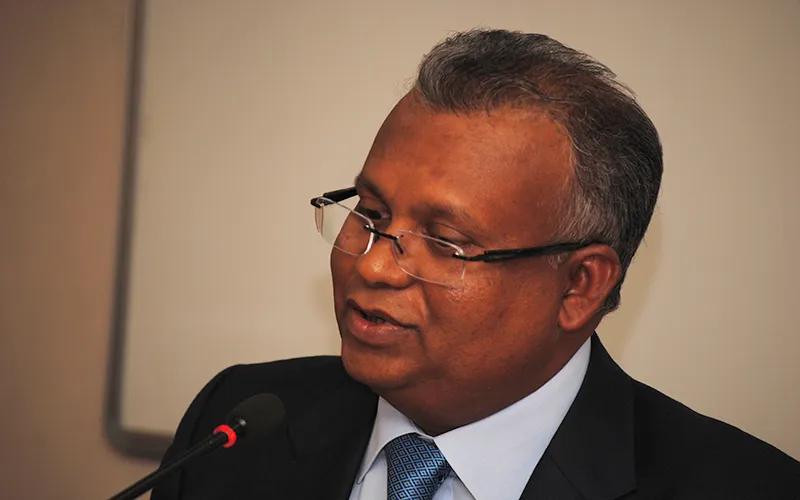-
CENTRES
Progammes & Centres
Location
Maldives Dhivehi Rayyethunge Party (DRP) chief, Mr. Thasmeen Ali, has said that the first government under the new Constitution, the government of President Nasheed, did not display courage and patience to follow the path of democratic governance.

The leader of the Dhivehi Rayyethunge Party (DRP) in Maldives, Mr. Thasmeen Ali, said that the first government under the new Constitution, the government of President Nasheed, did not display courage and patience to follow the path of democratic governance.
"As a result of this, the nation is held up by the current transition process. Thus the priority of the new President, when elected, would be to rebuild people’s confidence in democracy. And to develop such confidence amongst the people, the leadership must show commitment and conviction in adhering to the principles of democracy and must see through the process of democratic change," Mr. Thasmeen Ali said delivering a talk on "Challenges to an Infant Democracy: The Maldives Experience" at Observer Research Foundation on July 4, 2012.
Mr. Thasmeen Ali appreciated the continuous engagement by the Government of India to facilitate an early resolution to the ongoing political stalemate in Maldives. He highlighted the efforts of Indian Foreign Secretary Ranjan Mathai and his multiple visits to the nation during trying times and also of the Indian High Commission in Male, lead by Ambassador Mullay.
The talk and the interaction was organised as Maldives are going to celebrate its 4th anniversary of its new constitution in few days.
Mr. Thasmeen Ali began the talk by explaining the Maldivian experience with democracy and the ongoing political developments. He touched upon the road to a democratic Maldives and said that the nation had ratified a new constitution in 2008 which embraced the principles of modern democracy and multi-party elections under a presidential system, thereby marking a change from a 30-year period of authoritarian rule.
However, the President elected under this system, Mr Nasheed, had resigned on February 7 on the third year of his Presidency, resulting in the first major challenge to the infant democracy, he noted. As stipulated in the new constitution, the Vice President, Dr. Mohamed Waheed Hassan Manik, was then sworn in as the 5th President of the Maldives and is expected to stay in office for the remaining period of the five-year-term of the Presidency, Mr. Thasmeen Ali said.
He said Mr. Nasheed had resigned in front of the media accompanied by his cabinet, saying he resigned for the national good. But then the very next day he argued that he resigned under duress. This has created a controversy and has now resulted in the establishment of a Commission of National Inquiry with international experts to look into the circumstances of the transfer of power, he said.
Mr. Thasmeen Ali said, prior to this, the introduction of democracy had resulted in rising the expectation of the people in delivering over all improvements when compared to the previous system of governance. But then the aspirations of the people under the Nasheed government were not meet, since there was a lack of sincerity on the part of the government to see through the democratic process. The new system had witnessed increased levels of corrupt practices and overall inefficiencies in the matters of administration. These were accompanied by the government breaching important fundamentals of democracy which were similar to the pre-democratic days. The notable case of the unlawful detention and arrest of a Senior Judge of the Criminal Court by the military were one of the many developments that leaded to the resignation of President Nasheed.
He said the other instance of government excises was in undermining the role of the civil services, the single largest employer. To limit the political influence with the civil services the nation had enacted the Civil Services Act in 2007, with an independent commission. However the President Nasheed’s government made significant political appointees by making new appointments at executive levels and by registering existing civil service employees as political appointees. This resulted in a rise in the number of bureaucrats directly under the purview of the executive. The government has also formed public corporations and transferred significant sections bureaucrats to it. These corporations were not under the purview of the Civil Service Commission, hence again increasing the influence of the executive within the ranks of the civil services and compromised the effectiveness of the Civil Service Act.
Mr. Thasmeen Ali said even the media was influenced by the government to a large extent. During the 30 year rule of President Gayoom, state media was a tool for propaganda. One of the demands of the people during the democratic reform period from 2003 onwards was for a free and independent media. But this was not to be case. The Nasheed government refused to transfer the assets of the state broadcaster, MBC (Maldives Broadcasting Corporation) to the new statutory body. The government essentially refused to comply with the legislation simply because the members of the MBC board of directors appointed by parliament was not to their liking.
(This report is prepared by Sripathi Narayanan, Research Assistant, Observer Research Foundation, New Delhi)
Click Here for Full text of Mr. Thasmeen Ali speech
The views expressed above belong to the author(s). ORF research and analyses now available on Telegram! Click here to access our curated content — blogs, longforms and interviews.